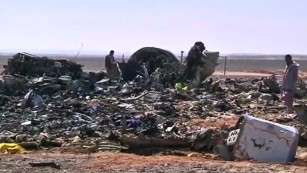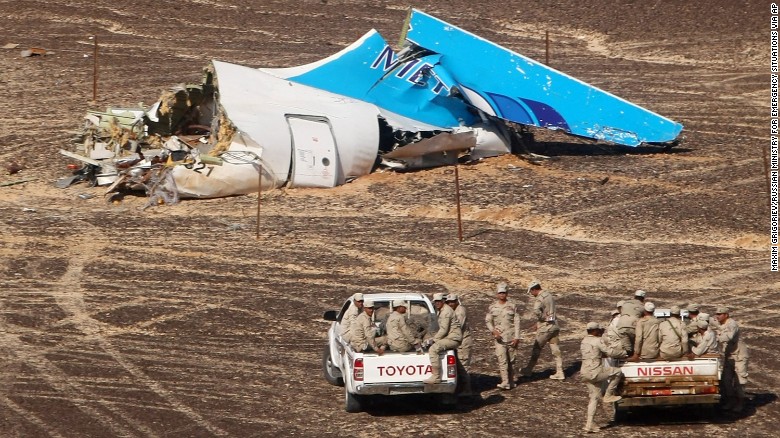Investigator: Noise heard in final second of Metrojet Flight 9268
A noise was heard in the final second of the cockpit voice recording on Metrojet Flight 9268 as it ascended on autopilot before apparently breaking up about 23 minutes after takeoff, the head of Egypt's investigation said Saturday.
The Russian passenger jet crashed in the Sinai Peninsula last weekend, killing all 224 people aboard.
While U.S. and UK officials have said there may have a bomb aboard the jet, the chief of the investigation said authorities have not reached any conclusion as to what brought down the flight.
"All the scenarios are out on the table," Ayman al-Muqaddam told reporters. "We don't know what happened exactly."
Still, European investigators who analyzed the two flight recorders are saying the crash is not an accident, CNN affiliate France 2 reported Friday.
The investigators said the cockpit voice recorder indicates an explosion, and the flight data recorder confirms the explosion was not accidental, and there was no sign of mechanical malfunction during the initial part of the flight, France 2 reported.
Everything was fine during the first 24 minutes, then in a fraction of a second there was a blackout and no further cockpit conversation, convincing investigators there was a bomb on board, according to France 2.
Inflight breakup
But Muqaddam said Egyptian authorities have not been provided any information or evidence tied to reports suggesting that a bomb took down the flight. He urged the sources of the reports to pass along related evidence to Egyptian investigators.
Muqaddam did not describe the noise investigators picked up from the cockpit voice recorder when the flight disintegrated midair while traveling at 281 knots (323 mph) at about 30,000 feet and climbing.
"A spectral analysis will be carried out by specialized labs in order to identify the nature of this noise," he said.
The investigation includes experts from Egypt, Russia, France, Germany and Ireland. In recent days the probe has been hampered by bad weather, Muqaddam said.
Debris from the plane was scattered over an area more than 13 kilometers long, suggesting an in-flight breakup, according to Muqaddam.
"Maybe it's a lithium battery, maybe it's an explosion, maybe it's ... a mechanical issue," he said the possible cause of the crash.
Earlier Saturday, Egyptian Foreign Minister Sameh Shoukry said the international community had not heeded Egypt's calls to deal seriously with terrorism.
Other countries "did not show a level of cooperation and direct targeting of these organizations that we hoped for," Shoukry said. "I can say these calls were not heeded by many of the parties who are now working to protect the interests of their citizens."
While couched as a complaint, the statement appeared to mark a significant reversal for Egypt, where officials, perhaps concerned about the fate of the tourist industry, had spent a week rejecting the idea that the Russian plane fell victim to terrorism.
Homeland Security Secretary Jeh Johnson told CNN's Barbara Starr that officials were taking "precautionary interim steps" to increase security on international flights into the United States during the investigation of the Egypt air disaster.
"ISIL is out there now active in a lot of different areas and, while this investigation is pending and because we have this group claiming responsibility, we believe it's significant to do these things on an interim basis," he said, referring to claims of responsibility by the Sinai branch of the terror group also known as ISIS.
Johnson said authorities are evaluating whether additional measures were necessary.
DHS chief seeks to reassure American fliers after downing of Russian plane
Experts weigh in
CNN aviation analyst Richard Quest said there would have been different data on the black boxes had there been a catastrophic failure rather than an explosion. The key is what happened just before the data suddenly stopped, he said.
"It's this split second, and it's a millisecond, where you hear an explosion of some description," he said. "And you see all the parameters go haywire before the power is completely lost. If this report is accurate, (investigators) have now analyzed that ... heard it and they can identify it."
Had the plane broken apart due to structural failure, there would have been more noise, and for a longer time, he said.
How chatter helped drive U.S. suspicion of bomb plot
Egypt's announcement
Russian President Vladimir Putin suspended Russian air traffic with Egypt on Friday until the cause of the crash is determined, the Kremlin said.
The United States and Britain shared their intelligence with Russia before Putin decided to suspend flights, Kremlin spokesman Dmitry Peskov told CNN's Matthew Chance.
Putin spoke with Egyptian President Abdel Fattah el-Sisi about the security situation in Egypt.
"The two leaders agreed to strengthen cooperation between the relevant security authorities in the two countries," el-Sisi's office said.
Russia's resistance
Russia had resisted the theory that a bomb brought down the airliner.
The jet, carrying mostly Russian families returning from Red Sea vacations, was 23 minutes into its flight last Saturday from Sharm el-Sheikh to St. Petersburg when it disappeared from radar over Egypt's Sinai Peninsula.
A U.S. satellite detected a heat flash over Sinai. The plane broke apart and fell 30,000 feet. All aboard died.
Russia's about-face buttressed a theory about the cause of the crash. As investigators pick through the rubble of the Russian airliner, and as Western officials sift through their own intelligence reports, some suspect Flight 9268 was brought down by a bomb planted in its hold.
And some believe think the bomb may have been smuggled on board in the Egyptian resort of Sharm el-Sheikh, from which the flight departed.
Since Friday, 1,200 Russian citizens have been evacuated from Egypt on 6 planes,Russian state broadcaster Russia 24 reported, quoting Oleg Safonov, the chief of Russia's Federal Agency for Tourism Oleg Safonov. The channel reported that the Egyptian military checked the passengers before they boarded the planes.
About 80,000 Russian tourists remain in Egypt, with 79,000 of them in Hurghada and Sharm el-Sheikh, he said. Hurghada, like Sharm el-Sheikh, is a Red Sea tourist city.
And UK officials were "urgently" working with Egyptian authorities on "permanent measures that will allow British tourists to come back to Sharm el-Sheikh as soon as possible," the British Embassy in Cairo said Saturday. The embassy statement said "Britain is not evacuating its tourists early from their holidays."
Opinion: What's at stake for Putin in investigation
Bomb theory
The bombing theory emerged Wednesday, when Britain suspended flights from Sharm el-Sheikh to the United Kingdom because of security fears.
It gained currency when it was expressed publicly by British Prime Minister David Cameron and U.S. President Barack Obama, though neither called it a certainly.
Talks between the United States, Egypt and Russia could result in the FBI providing some experts, particularly bomb technicians, to assist in the investigation, according to a U.S. official.
Cameron said it was "more likely than not" that the cause of the crash was an onboard bomb. Obama said it was "certainly possible."
On Friday, the BBC quoted UK intelligence officials as saying the plane may have been brought down by a bomb smuggled on board by someone working at the airport in Sharm el-Sheikh. The BBC said the intelligence came from "intercepted communication between militants in the Sinai Peninsula."
Egyptian officials publicly continue to resist the likelihood of a bombing -- perhaps concerned about the country's tourism industry -- but a high-level Egyptian official who declined to be named due to the sensitivity of the matter said the possibility of a bomb is "a theory we are not discarding."
If plane was bombed, where might suspicion fall?
Did ISIS down plane?
Signs pointing to ISIS as the culprit, another U.S. official said, came from monitoring the terrorist group's internal messages. Those messages are separate from public ISIS claims of responsibility, the official said.

Who is ISIS in Sinai Peninsula?
In an audio message from ISIS' Sinai branch that was posted Wednesday on terrorism-related social media accounts, the organization insisted it had brought down the flight.
Typically, ISIS is quick to trumpet how and who carried out attacks, for purposes of praise and propaganda. For some, ISIS' failure to provide details in this case raised doubts about its claim of responsibility.
But Paul Cruickshank, a CNN expert on terrorism, said the lack of detail might have been to protect a mole recruited in the airport to plant the bomb on the plane.
A near miss
A British passenger jet headed to the Egyptian resort of Sharm el-Sheikh narrowly "dodged" a missile in August, the UK media reported following a Russian jet crash in the same area this week.
The Thomson Airways jet with 189 people aboard took off from London and was headed to the Red Sea resort, according to The Guardian.
It said the jet came within 1,000 feet of a missile in its trajectory August 23, and went on to land safely.
"We investigated the reported incident at the time and concluded that it was not a targeted attack and was likely to be connected to routine exercises being conducted by the Egyptian military in the area at the time," a UK government spokesman said in a statement.
An Egyptian official said via Twitter that the incident involved a military exercise and the plane was not in danger.
News Courtesy: www.cnn.com











